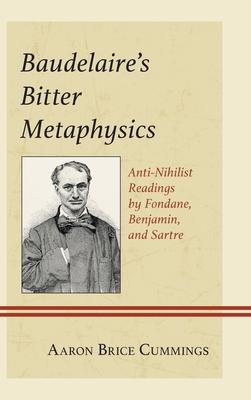Baudelaire's Bitter Metaphysics: Anti-Nihilist Readings by Fondane, Benjamin, and Sartre reconstructs a philosophical trialogue that might have been expected to take place between Benjamin Fondane, Walter Benjamin, and Jean-Paul Sartre over their philosophical readings of Charles Baudelaire, an exchange preempted by the untimely deaths of two of the interlocutors during the Nazi holocaust. Why did three of Europe's sharpest minds respond to the terror of 1933-45 by writing about a long-dead poet? Aaron Brice Cummings argues that Fondane, Benjamin, and Sartre turned to the poet of nihilism's abyss because they recognized a fact of cultural history that remains relevant today: until sometime in the 2080s, the literary world will have to confront (even if to deny) the two-century window forecast by Nietzsche as the age of cultural and existential nihilism. Accordingly, the author examines the bitter metaphysics latent in Baudelaire's motifs of the abyss, clocks, brutes, streets, and bored dandies. In so doing, this book confronts the nothingness which modern life encounters in the heart of art, ethics, ideality, time, memory, history, urban life, and religion.

Baudelaire's Bitter Metaphysics: Anti-Nihilist Readings by Fondane, Benjamin, and Sartre
Baudelaire's Bitter Metaphysics: Anti-Nihilist Readings by Fondane, Benjamin, and Sartre reconstructs a philosophical trialogue that might have been expected to take place between Benjamin Fondane, Walter Benjamin, and Jean-Paul Sartre over their philosophical readings of Charles Baudelaire, an exchange preempted by the untimely deaths of two of the interlocutors during the Nazi holocaust. Why did three of Europe's sharpest minds respond to the terror of 1933-45 by writing about a long-dead poet? Aaron Brice Cummings argues that Fondane, Benjamin, and Sartre turned to the poet of nihilism's abyss because they recognized a fact of cultural history that remains relevant today: until sometime in the 2080s, the literary world will have to confront (even if to deny) the two-century window forecast by Nietzsche as the age of cultural and existential nihilism. Accordingly, the author examines the bitter metaphysics latent in Baudelaire's motifs of the abyss, clocks, brutes, streets, and bored dandies. In so doing, this book confronts the nothingness which modern life encounters in the heart of art, ethics, ideality, time, memory, history, urban life, and religion.